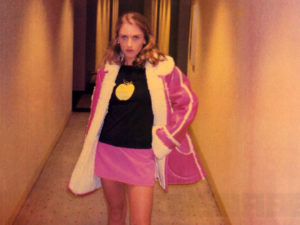Liz Phair’s in love.
The women who ranted about lust and searched for one good man on her splendid debut album, Exile in Guyville, has found the relationship she was looking for.
Has it changed her music? Somewhat. But the frank sexual talk of Guyville hasn’t been lost. Evidence this lyric set to the “Chopsticks” melody: “I met him at a party/He said he liked to do it backwards/I said, ‘That’s just fine with me/’That way we can fuck and watch TV.'”
“I can’t help it; no matter how I do this, my best songs have profanity in them,” Phair, 26, exclaims with a laugh. “I get attacked for it; someone’s always going to say I’m trying to shock. But I swear to God, these are my best songs. It isn’t to be shocking. I just keep writing this way.”
Phair understands why these songs cause such a stir. “Men don’t think that nice girls from good families should have these thoughts,” she says. “But we do.”
Phair hails from the Chicago suburb of Winnetka. Her father is an AIDS researcher and chief of infectious diseases at Northwestern University Memorial Hospital. Her mother is an art teacher. Phair studied art at Oberlin College and made a living selling charcoal drawings before she began making music.
The songs on Guyville were inspired by her musical and personal dealings in Chicago’s male-dominated underground rock scene. It was one of 1993’s most acclaimed albums and set Phair up as an unwitting — but not unwilling — feminist spokeswoman.
“I know how it works,” she says. “Any spokesperson gets ripped down. I’m at the top of the mountain now. I’ll be rejected, then rediscovered and returned to prominence. The game plan is just to work through it and keep doing what I do regardless of what kind of role I’m assigned outside the music.”
Right now, Phair is busy making more music, finishing songs for an album due out this fall. She says to expect “basically good ol’ Liz Phair stuff, love and minutiae,” but she acknowledges that the new relationship — with the editor of her first video — has put a new spin on her songs.
“I’m in more of a settled state — but of course it’s not that settled,” she says. “There’s more freedom, more joy, less tension, although there’s absolute outbursts, too.”
“There’s one song called ‘Jealousy’ that I’m really proud of… I never experienced jealousy until I met my boyfriend. I did not realize how much I had controlled situations in the past and how demanding I had been, without being perceived as demanding, ever. I prided myself on the fact that they loved me this way because I was in some way better. It didn’t occur to me that maybe I was being a manipulative jerk, you know?”
By Gary Graff
Knight-Ridder/Tribune News Service, April 7, 1994
Note: This article was also picked up in Raleigh, North Carolina’s The News & Observer on April 17, 1994 under the headline, “Girl Talk in ‘Guyville.”






